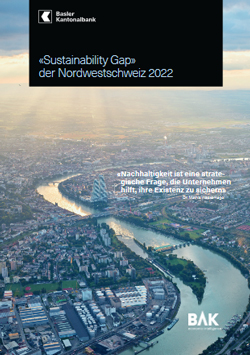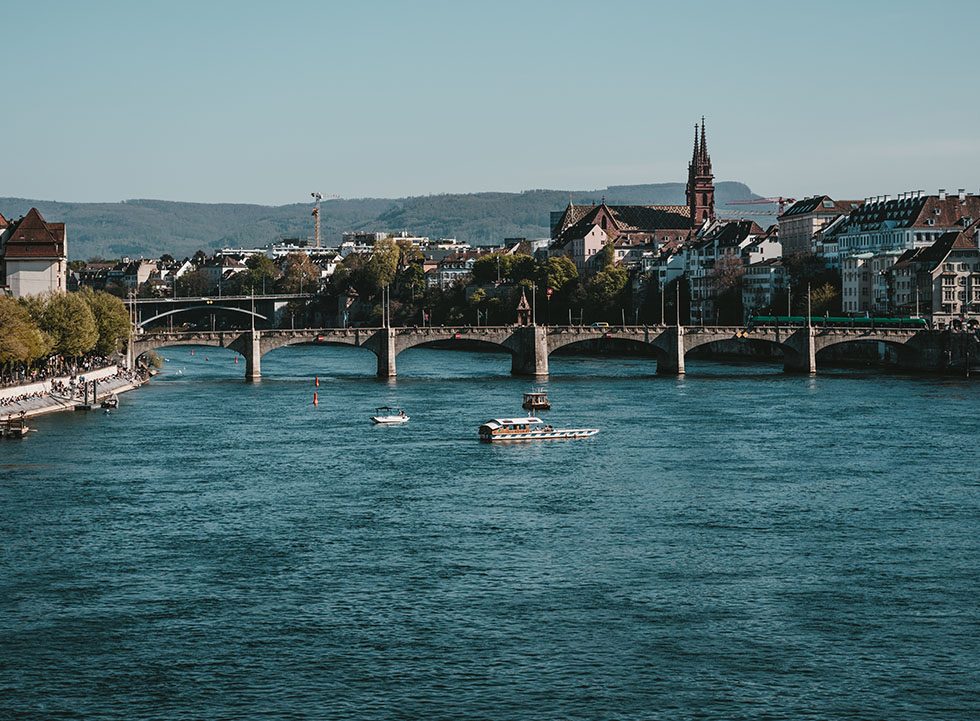Global Footprint Network contributes to a sustainability study of the region of Basel, Switzerland
As a result of the coronavirus pandemic and the war in Ukraine, the context for many economies has changed considerably. In addition, as the effects of climate change become more visible, climate change and resource constraints have become an ever more popular topic around the world and in the Basel, Switzerland region.
To illuminate the implications, Basler Kantonalbank (BKB), with a longstanding commitment to sustainability, commissioned a study by BAK, a Basel consultancy for economic intelligence, with additional support from Global Footprint Network. The goal of this study was to evaluate how well-prepared companies in the region of Northwestern Switzerland are for a future of climate change and resources constraints.
 Released on September 22, 2022, the study concludes that the region shows a significant “sustainability gap” and recommends that if companies in the region want to persist, they incorporate climate change and resource scarcity into their operational and strategic considerations more strongly.
Released on September 22, 2022, the study concludes that the region shows a significant “sustainability gap” and recommends that if companies in the region want to persist, they incorporate climate change and resource scarcity into their operational and strategic considerations more strongly.
The report, only available in German, also includes an interview with Global Footprint Network founder Mathis Wackernagel. An English translation of the interview is available below, or download the full report in German.
Sustainability is not merely a moral issue, but a strategic one that helps companies secure their long-term existence
 How would you define sustainability?
How would you define sustainability?
It is not sustainable to consume more than nature can regenerate. Therefore, a necessary condition for the sustainable existence of humanity is to live within the Earth’s regenerative capacity. This means living without overusing the Earth’s renewable resources. The sum of these renewable resources is the material bottleneck for humanity. The regenerative capacity, or biocapacity as we call it, also determines how many non-renewable resources, for example oil, gas, and coal, can be used. Obviously, the reserves of fossil energy underground are limited. But even more limited is the biosphere’s absorption capacity for carbon emissions, which in turn is a piece of Earth’s regenerative capacity. Another condition for sustainable development is that people want to maintain or even improve their quality of life.
What is Earth Overshoot Day and when will it be reached in Switzerland?
Climate change and scarcity of resources will increasingly shape the future. As a result, resource security is also becoming increasingly essential for economies. At Global Footprint Network, we measure regenerative resource security for countries, cities, and companies. Our renewable resource accounting results, now produced with FoDaFo and York University, allow us to determine Earth Overshoot Day: that day marks when humanity has used up the annual regenerative resource budget of the biosphere. This year it fell on July 28. That means we humans live as if there were 1.75 Earths. The missing 156 days of the year after Earth Overshoot Day correspond to the overuse of natural resources. If everyone lived as we do in Switzerland, we would have reached Earth Overshoot Day already on May 13. This means that humanity would be 232 days short this year.
What impact do you think the scarcity of resources will have on companies in northwestern Switzerland?
The enormous global overuse of resources is hardly reflected in commodity prices. This shows that the market is not continuously adjusting. It will therefore correct itself through shocks, which is more unpleasant. For instance, our enormous resource dependence makes us vulnerable to short-term shocks like the ones induced by the Ukraine war.
Companies that offer products and services whose production and use depend on high resource consumption will have a much harder time in a future of climate change and resource constraints. An obvious example: On average, companies that produce specialty components for internal combustion engines will have a harder time in the future than those that supply parts for e-bikes. Life sciences will have to ask themselves what therapies people will be able to afford in the future and how to produce globally in a potentially disrupted world of resource scarcity and climate change. The strategic question for all companies is: If your company expanded, would global overshoot be higher or lower? If it would be lower, you have a significant strategic advantage.
How can companies best prepare for the resource-constrained future?
First evaluate the relevance to your own business. Start by recognizing that in all possible scenarios, climate change and resource scarcity are becoming an ever more significant condition for our economies. There are good chances that our region will phase out fossil energy in less than 20 years. If not, then resource and climate problems will become even more dominant and will pose other kinds of challenges. Ask yourself: What does a fossil-free future mean for my company? Will the products my company provides still be in demand then? This is not a moral question, but a central strategic question that helps companies secure their long-term existence. It is crucial for companies to be able to adapt effectively and quickly. After all, the resource-scarce future is arriving faster than the infrastructure of cities and companies typically adjusts.
Do you see any need for action on the part of public administration in this context? In your eyes, are there any framework conditions that would make it easier for companies to do business in a more resource-efficient way?

There is still some room to maneuver for public administrations. In Switzerland, the CO2 law was rejected in 2021, even though the law itself was already a compromise. This demonstrates that society still largely ignores the economic relevance of resource issues. The war in Ukraine makes this relevance very obvious right now. Switzerland would have the capacity to act with foresight and to prepare, because it has innovation potential, a well-educated workforce and access to capital. We could leverage these strengths. First, however, we must recognize the seriousness of the situation for ourselves. We are not just spectators of this situation, but participants of the game.
The public administration of Basel, and any other region, might ask itself whether there is a gap between what would be essential to keep the region functioning and what is planned today. In my view, the gap is alarmingly wide.
Investments in resource-saving and climate-friendly solutions are often very costly. Why are these investments worthwhile – especially today?
Every single Swiss franc anybody spends in the region is an investment. In fact, it’s not necessarily about additional budget, but rather about making better use of existing budgets. Better allocation of existing budgets increases our chances of success. They need to take into account the emerging context of resource scarcity and climate change. Informing their strategy by sustainability drivers, and reacting to them, is becoming essential for companies that want to maintain their value.



